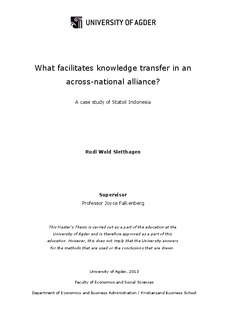| dc.description.abstract | Knowledge is recognized as one of the most valuable recourses for an organization to have. Valuable knowledge can give an organization competitive advantage and can be attractive for other organizations. Today strategic alliances come together because of their different skills or knowledge that each of them want to acquire. In many situations, valuable knowledge is difficult to imitate, and alliances are made so they can transfer this knowledge effectively and efficiently. Knowledge transfer across borders becomes increasingly important for global organization, and organization from emerging markets to be competitive in both domestic and global markets. But how is knowledge transferred in such a context?
To be able to transfer knowledge successfully across national borders, you need to know what facilitates knowledge transfer. This is the main purpose of this thesis is to investigate: what facilitates knowledge transfer in an across-national alliance? I will also look at what may be a barrier for knowledge transfer in this context. To achieve the research problem this thesis will aim to develop a suggested framework from adapted versions of Simonin (1999, 2004) models and other relevant empirical research that has been done during the last two decades.
In this study I will use a qualitative approach based on collecting data from seven respondents representing an alliance between two oil and gas companies located in Indonesia; Statoil Indonesia and Pertamina. There will be conducted in-depths interviews, and the respondents will represent three groups: (1) top management of Statoil Indonesia, (2) Pertamina employees and (3) Indonesian Statoil employees.
A final framework is suggested and got support for following factors: knowledge tacitness, learning intent, knowledge relatedness, partner relationship and culture distance. The research contributed to expand the culture distance factor with two sub-factors: collective society and power distance. During the research, the factor X – mobile human knowledge; was discovered and was shown to be a main contribution in this research. It showed that human knowledge is not only mobile, but it showed a downside with knowledge transfer. That mobile human knowledge is a challenge for an organization; how do you keep human knowledge within the firm? The research also discovered that knowledge gives power for Indonesians, and they showed reluctance in sharing knowledge, and recognized that knowledge sharing is not necessarily the same as knowledge transfer. | no_NO |
